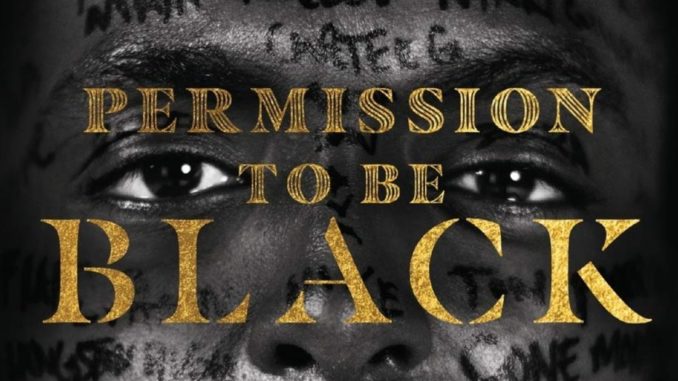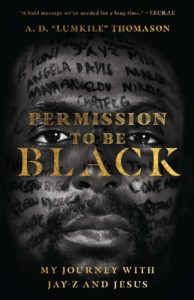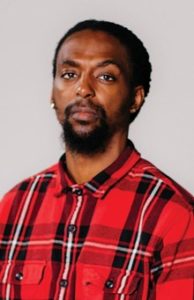
Podcast (beyond-the-page): Play in new window | Download
Subscribe: Apple Podcasts | RSS
I almost didn’t read Permission to be Black because I knew that I—a white man—was not the primary audience. But as the father of a Black son who realizes the need for him to have a Black identity, I decided I needed to read it for him. That led to this following conversation with author A.D. Thomason, covering everything from understanding and processing generational trauma to leaving the evangelical church to what the Black community needs from white activists. It was a thoughtful conversation and I’m thankful to A.D. for his time. Check out the excerpt below, then listen the full episode wherever you get your podcasts or just by clicking the play button above.
The Interview | Permission to be Black by A.D. Thomason
This transcript has been lightly edited for clarity.
Josh Olds: What was it that led to you writing Permission to be Black?
AD Thomason: I was finishing counseling for the first time, which is a taboo in my culture, African American culture, inner city culture. And I was coming back from counseling, and I felt that my counselor gave me what I would call a cheat codes, you know, secrets, if you will…I saw them as such because they were so wise they were—so I felt like I was getting ahead in life.
And my people didn’t know about any of these, you know, as far as like: How to tell your story, how to release yourself, how to wrestle through your birth order, asking your parents “what was going on during my birth? Like, were you stressed? Were you joyful?” and that tying in to what type of child you were.
And then I started looking at why haven’t African Americans in the Diaspora known about this…oooooh…slavery? Right? Yeah, the slavery, you got Jim Crow piece. You got this Civil Rights piece. You got this redlining piece. And so as I started tracking through the eras, reverse engineering them, and I realized we weren’t considered human, and then we didn’t have a freedom to process our humanity and traumas and hurts and heal, because of the objectification.
Right? And so the burden in writing Permission to be Black was, because we’ve legally been withheld that permission to express our identity. And then now, we need the permission to be fully healed. And that hasn’t been something that’s been granted to us.
We’ve legally been withheld that permission to express our identity. And then now, we need the permission to be fully healed. – AD Thomason
Josh Olds: In the first few chapters of the book, you write about how that trauma makes a lot of people put on a false self, and they’re never really being true to who they are. And some of that is self-preservation. Majority culture is saying, “This is the way we want you to be. This is the acceptable version of you, that we’re willing to see.” How do you begin to undo that as an individual, when you still have these systems of oppression still in place?
AD Thomason: Yeah. So, the biggest delineation I tell people they have to make or they’re not gonna be able to do it is—you have to delineate between human freedom and fulfillment juxtaposed to earthly success. If you tie earthly success to your humanity, you can’t do it. That’s the reason why you had the minstrel shows, or the Stepin Fetchits, or the you know, the Sambos, because they had to, quote unquote, “tap dance” to get this money in public. But then they’re another person in private, right? And the way you undo it is, you can’t tie your results to majority culture’s offerings. And that’s the problem. When you tie your results to majority culture’s offerings—well, you’re going to be at the whim of them. So you know, you got to be a nice Negro who wears button downs because you believe your success is tied to that. And when I say success, I’m talking about tangible results, versus being the fullest version of you despite the results. And a lot of people, that’s gonna be a wrestle for them, because for me, humanity is based on breathing, eating, shelter, and providing for your family.
So you have to undo it by asking yourself “What is most important to me?” And I’ll be honest with you, for most people, myself included, they’re going to be told through schools and through parents, that tangible good and progression through the European race is what’s most appealing. So if you have to temper down or alter or code switch to get that, then that’s what you do. And I’m telling you, you have permission not to be that anymore. There’s something bigger beyond this. We’re made for something bigger.
The Book | Permission to be Black
 Embracing your Christian identity does not make you “soft.” Embracing your Black identity does not make you less Christian. Throughout American history, Black people were not given the freedom to acknowledge their suffering. A. D. Thomason believes that the Holy Spirit brings freedom and liberation as we’re able to name our pain, recognize its roots in history and society, and seek healing.
Embracing your Christian identity does not make you “soft.” Embracing your Black identity does not make you less Christian. Throughout American history, Black people were not given the freedom to acknowledge their suffering. A. D. Thomason believes that the Holy Spirit brings freedom and liberation as we’re able to name our pain, recognize its roots in history and society, and seek healing.
While many saw a confident, six-foot-five Black man, A. D. “Lumkile” Thomason lived most of his life in fear and anguish, deeply wounded by encounters with violence, abandonment, and family tragedy. Hiding behind a tough exterior, Adam earned his “Black card” but felt joyless inside. Even traveling around the globe to play professional basketball could not resolve his despair. But in the art of Jay-Z, A. D. discovered stirring honesty that gave voice to his own expressions of longing. And in the gospel of Jesus, he experienced the healing and salvation that had long evaded him. Now through what he calls “kingdom therapy,” he’s figuring out how to redefine the Jay-Z and Jesus that make up his blackness.
A. D. uses his artistry as a poet and storyteller to share how he confessed his internalized pain and embraced the liberating joy of Christ. He writes for millennials, emerging adults, and anyone else who’s ready to acknowledge the reality of racial trauma and our need to confront it. A. D.’s powerful story gives you permission to be Black, to be Christian, and to be the person God has made you to be.
The Author | AD Thomason
 A. D. “Lumkile” Thomason is a speaker, poet, and award-winning filmmaker. He has spoken around the nation and in places such as Sudan, South Africa, China, and Palestine. As an adjunct professor at Kilns College, he teaches on human rights, de-colonizing your faith, and filmmaking. A native of Detroit, A. D. has more than seventeen years of experience preaching and teaching the peace of Jesus in ethnically divided countries, cultures, and communities. He and his wife, Dawntoya, live in the Atlanta area with their family.
A. D. “Lumkile” Thomason is a speaker, poet, and award-winning filmmaker. He has spoken around the nation and in places such as Sudan, South Africa, China, and Palestine. As an adjunct professor at Kilns College, he teaches on human rights, de-colonizing your faith, and filmmaking. A native of Detroit, A. D. has more than seventeen years of experience preaching and teaching the peace of Jesus in ethnically divided countries, cultures, and communities. He and his wife, Dawntoya, live in the Atlanta area with their family.
Learn more at permissiontobeblack.com.
